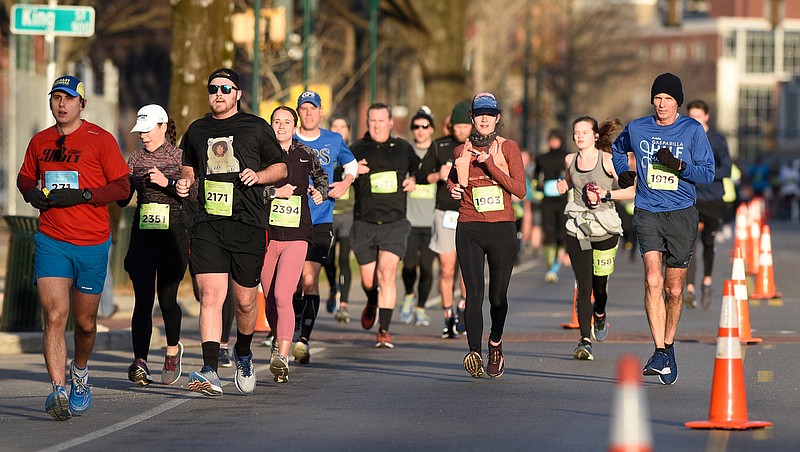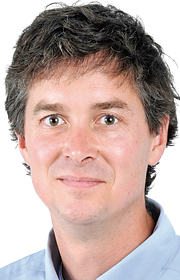I am a runner.
So, too, was Ahmaud Arbery.
For 30 years now, running has been part of who I am and what I do. There's freedom: on trails, at races, through neighborhoods and downtown. I've run thousands of times with hundreds of people in dozens of cities.
Each time, one thing is almost certain: there will be no black or brown people with us.
Running, like most outdoor sports, is a mostly white experience.
Arbery's shooting death begs us to confront this.
It was February. Broad daylight in Georgia. Arbery, 25, had gone for a run.
Yet two white men later arrested for his murder saw Arbery not as a runner, but as a criminal.
These are the dynamics of a lynching. The white mind projects criminality onto black men - seeing them for what they're not - and then with vigilante arrogance, assumes god-like superiority. Armed white men were chasing black men on foot through Georgia 200 years ago.
And again in 2020.
Trayvon was walking, Eric was streetcorner-standing, Philando was driving, Tamir was playing, Ahmaud was running. He was 2.23 miles into a search for groundlessness and movement and freedom.
He was a runner.
Not a threat. Not a criminal.
If black and brown runners were more commonplace, if running was less a white experience and more diverse, would Arbery have been safer? Would he still be alive?
Why are American runners not up in arms over a shooting death of one of our own?
Chattanooga, these are our questions.
We are a racialized Southern city.
We are also the Best Outdoor City in the South.
This means we are doubly responsible; we have a powerful opportunity to soul-search the way color and outdoor sports merge together. Or don't.
How many African American or Hispanic runners do you know in this city?
Or black or brown rock climbers?
Or black or brown mountain bikers?
Or black or brown kayakers?
The remaking of our city's identity as an Outdoor Capital was an economic, social and, yes, racial decision. Intentional or not, the act of re-branding our city around outdoor sports popularized by whites sends a racialized message: some are welcome, some not.
A black runner and I may run the same 5-mile course, same brand of shoes, same pace.
But our experience will be different.
It is time we confront this.
"For too long, the running community has pretended as though it were possible to keep politics out of running," writes well-known African American endurance athlete, author and activist Alison Mariella Desir in Outside.
Black and brown bodies have rarely moved throughout American history in the same way white bodies have; to glide through local streets impervious and unthinking is part of my whiteness. It is time I wake up to that.
"When I go for a run as a black woman, that in and of itself is a political act and one that puts me at risk - fearing for my life," Desir writes. "As long as we live in a world steeped in white supremacy - and we do - being a black woman will never be separate from my identity as a runner."
Therefore, to imagine a Chattanooga where we routinely see black and brown runners, paddlers and climbers is to also imagine a Chattanooga of re-balanced racial relationships and norms.
Four years ago, James McKissic (then director of Multicultural Affairs) and Terri Chapin (Outdoor Chattanooga) started Outdoor Ambassadors, which creates outdoor experiences for African American and Hispanic Chattanoogans. Both McKissic and Chapin are remarkable; what they touch can turn to gold.
The Chattanooga Track Club, founded 50 years ago, is also instrumental to such work.
"As a club, we are saddened by the shooting death of Ahmaud Arbery," said president Jason Liggins. "As a leading fitness organization in the city, we must take on educating communities and runners."
Liggins, 40, mentioned past and present track club initiatives: working with local churches and Operation Get Active, outreach in minority communities, helping Howard High School's track and field team.
"There is still lots of work to be done," he said.
And the Chattanooga Track Club could lead the way.
Liggins is black. And a runner. And a historymaker: he's the club's first African American president.
"CTC's mission is to promote health and fitness through running and walking for everyone," he said.
Yes, everyone.
On May 8, countless #IRunWithMaud runners ran 2.23 miles in memory of Arbery. That same day, the track club posted 14 most important words:
"The Chattanooga Track Club believes everyone should have the right to run without fear."
David Cook writes a Sunday column and can be reached at dcook@timesfreepress.com.

